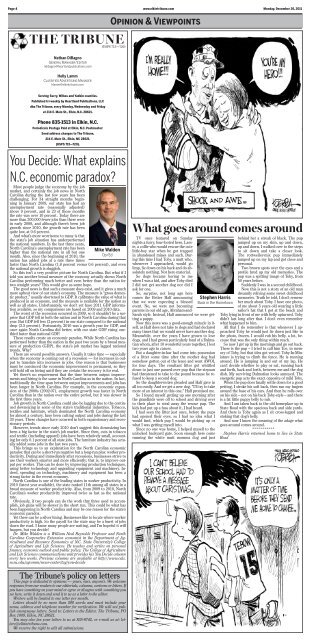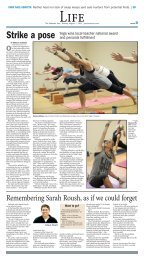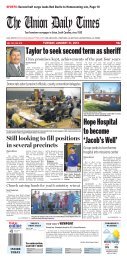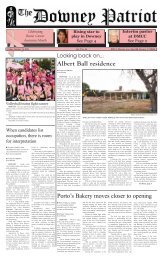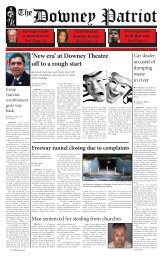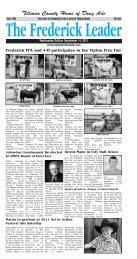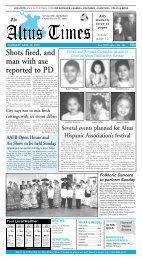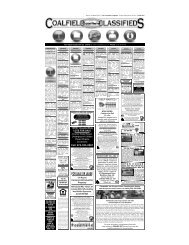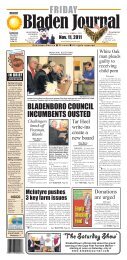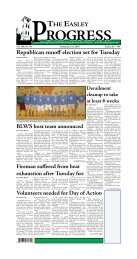Surry sheriffreprimanded, responds to county property allegations
Surry sheriffreprimanded, responds to county property allegations
Surry sheriffreprimanded, responds to county property allegations
You also want an ePaper? Increase the reach of your titles
YUMPU automatically turns print PDFs into web optimized ePapers that Google loves.
Page 4 www.elkintribune.com Monday, December 26, 2011<br />
THE TRIBUNE<br />
(USPS 715—720)<br />
Nathan DiBagno<br />
General Manager/Edi<strong>to</strong>r<br />
ndibagno@heartlandpublications.com<br />
Holly Lamm<br />
Classified Advertising Manager<br />
hlamm@elkintribune.com<br />
Serving <strong>Surry</strong>, Wilkes and Yadkin counties.<br />
Published tri-weekly by Heartland Publications, LLC<br />
dba The Tribune, every Monday, Wednesday and Friday<br />
at 214 E. Main St., Elkin, N.C. 28621.<br />
Phone 835-1513 in Elkin, N.C.<br />
Periodicals Postage Paid at Elkin, N.C. Postmaster:<br />
Send address changes <strong>to</strong> The Tribune,<br />
214 E. Main St., Elkin, NC 28621.<br />
(USPS 715—720).<br />
You Decide: What explains<br />
N.C. economic paradox?<br />
Most people judge the economy by the job<br />
market, and certainly the job news in North<br />
Carolina during the last few years has been<br />
challenging. For 34 straight months beginning<br />
in January 2009, our state has had an<br />
unemployment rate (seasonally adjusted)<br />
above 9 percent, and in 23 of those months<br />
the rate was over 10 percent. Today there are<br />
more than 300,000 fewer jobs than there were<br />
in early 2008, and although there’s been job<br />
growth since 2010, the growth rate has been<br />
quite low, at 0.6 percent.<br />
And what’s more worrisome <strong>to</strong> many is that<br />
the state’s job situation has underperformed<br />
the national numbers. In the last three years,<br />
North Carolina’s unemployment rate has been<br />
higher than the national rate in all but one<br />
month. Also, since the beginning of 2010, the<br />
nation has added jobs at a rate three times<br />
Mike Walden<br />
Op/Ed<br />
faster than North Carolina (1.8 percent versus 0.6 percent), and even<br />
the national growth is sluggish.<br />
So this isn’t a very positive picture for North Carolina. But what if I<br />
<strong>to</strong>ld you another broad measure of the economy actually shows North<br />
Carolina performing much better and even better than the nation for<br />
two straight years? This would give us some hope.<br />
The good news is that such a measure does exist, and it gives a much<br />
more upbeat view of our state’s economy. The measure is “gross domestic<br />
product,” usually shortened <strong>to</strong> GDP. It calibrates the value of what is<br />
produced in an economy, and the measure is available for the nation as<br />
well as all states. Unfortunately, we don’t yet have 2011 GDP information<br />
available, so my comparisons are based on 2009 and 2010 data.<br />
The worst of the recession occurred in 2009, so it shouldn’t be a surprise<br />
that GDP fell in both the nation and in North Carolina during that<br />
year. But GDP fell less (2 percent) in our state compared <strong>to</strong> the national<br />
drop (2.5 percent). Fortunately, 2010 was a growth year for GDP, and<br />
once again North Carolina did better, with our state GDP rising onethird<br />
faster than national GDP.<br />
These results create an economic paradox. While North Carolina has<br />
performed better than the nation in the past two years by a broad measure<br />
of production (GDP), the state’s job market has lagged national<br />
trends. Why?<br />
There are several possible answers. Usually it takes time — especially<br />
when the economy is coming out of a recession — for increases in output<br />
<strong>to</strong> translate in<strong>to</strong> increases in jobs. One reason is that businesses<br />
must be convinced the economic improvement is permanent, so they<br />
will hold off on hiring until they are certain the recovery is for real.<br />
Yet there’s no requirement that the time between output improvements<br />
and hiring is the same in North Carolina as in the nation. In fact,<br />
traditionally the time span between output improvements and jobs has<br />
been longer in North Carolina. For example, in the economic expansion<br />
of the 2000s (2002-07), employment growth was faster in North<br />
Carolina than in the nation over the entire period, but it was slower in<br />
the first three years.<br />
Job growth in North Carolina could also be lagging due <strong>to</strong> the continued<br />
downsizing in some of the state’s traditional industries. Tobacco,<br />
textiles and furniture, which dominated the North Carolina economy<br />
for almost a century, have been cutting output and jobs during the last<br />
30 years. These changes have occurred in both expansionary and recessionary<br />
periods.<br />
However, trends since early 2010 don’t suggest this downsizing has<br />
been a big fac<strong>to</strong>r in the state’s job market. Since then, cuts in <strong>to</strong>bacco<br />
and textile (including apparel) jobs have been relatively small, accounting<br />
for only 0.1 percent of all state jobs. The furniture industry has actually<br />
added some jobs in the last two years.<br />
This brings us <strong>to</strong> an explanation for the North Carolina economic<br />
paradox that can be a short-run negative but a long-run plus: worker productivity.<br />
During and immediately after recessions, businesses strive <strong>to</strong><br />
use their workers smarter and more efficiently; that is, <strong>to</strong> improve output<br />
per worker. This can be done by improving production techniques,<br />
using better technology and upgrading equipment and machinery. Indeed,<br />
spending on technology, machinery and equipment has been a<br />
strong fac<strong>to</strong>r in the recent economy.<br />
North Carolina is one of the leading states in worker productivity. In<br />
2010 (latest year available), the state ranked 11th among all states in a<br />
broad measure of worker productivity. Also, from 2009 <strong>to</strong> 2010, North<br />
Carolina’s worker productivity improved twice as fast as the national<br />
rate.<br />
Obviously, if two people can do the work that three used <strong>to</strong> accomplish,<br />
job gains will be slower in the short run. This could be what has<br />
been happening in North Carolina and may be one reason for the state’s<br />
economic paradox.<br />
Yet there can be a silver lining. Businesses like <strong>to</strong> locate where worker<br />
productivity is high. So the payoff for the state may be a burst of jobs<br />
down the road. I know many people are waiting, and I’m hopeful it will<br />
happen, but you decide!<br />
Dr. Mike Walden is a William Neal Reynolds Professor and North<br />
Carolina Cooperative Extension economist in the Department of Agricultural<br />
and Resource Economics of N.C. State University’s College<br />
of Agriculture and Life Sciences. He teaches and writes on personal<br />
finance, economic outlook and public policy. The College of Agriculture<br />
and Life Sciences communications unit provides his You Decide column<br />
every two weeks. Previous columns are available at http://www.cals.<br />
ncsu.edu/agcomm/news-center/tag/you-decide<br />
The Tribune’s policy on letters<br />
This page is dedicated <strong>to</strong> opinions — yours, ours, anyone’s. We welcome<br />
responses from our readers <strong>to</strong> our edi<strong>to</strong>rials, columns, car<strong>to</strong>ons or letters. If<br />
you have something on your mind or agree or disagree with something you<br />
see here, write it down and send it <strong>to</strong> us as a letter <strong>to</strong> the edi<strong>to</strong>r.<br />
Writers will be limited <strong>to</strong> one letter per month.<br />
Letters should be no more than 500 words and must include your<br />
name, address and telephone number for verification. We will not publish<br />
anonymous letters. Send <strong>to</strong>: Letters <strong>to</strong> the Edi<strong>to</strong>r, The Tribune, PO<br />
Box 1009, Elkin, NC 28621.<br />
You may also fax your letters <strong>to</strong> us at 835-8742, or e-mail us at: letters@elkintribune.com.<br />
We reserve the right <strong>to</strong> edit all submissions.<br />
Opinion & Viewpoints<br />
What goes around comes around<br />
TV once featured on Sunday<br />
nights a furry, four-footed hero, Lassie,<br />
a collie who would rescue the cute<br />
little-boy star when he got trapped<br />
in abandoned mines and such. During<br />
this time I had Toby, a mutt who,<br />
whenever I approached, would go<br />
limp, lie down on his back and do absolutely<br />
nothing. Not hero material.<br />
So dogs became boring <strong>to</strong> me<br />
when I was a kid, and after Toby died<br />
I did not get another dog nor did I<br />
ask for one.<br />
So, surprise, not long ago here<br />
comes the Better Half announcing<br />
that we were expecting a blessed<br />
event. No, we were not becoming<br />
parents in our old age, Abraham-and-<br />
Sarah style. Instead, Half announced we were getting<br />
a puppy.<br />
Now this news was a good-enough miracle in itself,<br />
as Half does not take <strong>to</strong> dogs and had declared<br />
many times that we would never have another dog.<br />
Meanwhile, over the years I have grown <strong>to</strong> love<br />
dogs, and I had grown particularly fond of a Dalmatian<br />
whom, after 10 wonderful years <strong>to</strong>gether, I lost<br />
two years ago <strong>to</strong> cancer.<br />
But a daughter-in-law had come in<strong>to</strong> possession<br />
of a litter some time after the mother dog had<br />
somehow gotten out of the fence and went AWOL<br />
for four days. The resultant litter got whittled<br />
down <strong>to</strong> just one passed-over pup that the stepson<br />
had threatened <strong>to</strong> take <strong>to</strong> the pound because he refused<br />
<strong>to</strong> keep a second dog.<br />
So the daughter-in-law pleaded and Half gave in<br />
all <strong>to</strong>o easily. And we get a new dog. “I’ll try <strong>to</strong> take<br />
more of an interest in this one,” Half promised me.<br />
So I found myself getting up one morning after<br />
the grandkids were off <strong>to</strong> school and driving over<br />
<strong>to</strong> their place <strong>to</strong> steal away the rescue pup. The<br />
kids had put up a fuss about it, I had heard.<br />
I had seen the litter just once, before the pups<br />
had opened their eyes, so I had no idea what I<br />
would find, which pup I would be picking up or<br />
what I was getting myself in<strong>to</strong>.<br />
Since no one was home, I helped myself <strong>to</strong> the<br />
unlocked backyard gate. Soon enough here come<br />
running the white mutt momma dog and just<br />
Stephen Harris<br />
Back in the Home<strong>to</strong>wn<br />
behind her a streak of black. The pup<br />
jumped up on my shin, up and down,<br />
up and down. I walked over <strong>to</strong> the steps<br />
<strong>to</strong> sit down and take a closer look.<br />
The rottweiler-mix pup immediately<br />
jumped up on my lap and got close and<br />
personal.<br />
Two brown spots over the eyes and a<br />
profile fired up my old memories. The<br />
pup was a spitting image of Toby, from<br />
50 years before.<br />
Suddenly I was in a second childhood.<br />
Now this is not a s<strong>to</strong>ry of an old man<br />
dreamily reliving some sweet childhood<br />
memories. Truth be <strong>to</strong>ld, I don’t remember<br />
much about Toby. I have one pho<strong>to</strong>,<br />
of me about 5 years old wearing a little<br />
sailor’s hat that I got at the beach and<br />
Toby lying in front of me with belly upturned. Toby<br />
didn’t last long after that. I don’t even remember<br />
what happened <strong>to</strong> him.<br />
All that I do remember is that whenever I approached<br />
Toby he would just lie down just like in<br />
the pho<strong>to</strong>, frozen. I would rub his belly, a lot, because<br />
that was the only thing within reach.<br />
So now I get up in the mornings and go out back.<br />
There is the pup – I tried <strong>to</strong> call him Toe, in memory<br />
of Toby, but that idea got ve<strong>to</strong>ed. Toby-In-Miniature<br />
is trying <strong>to</strong> climb the fence. He is running<br />
around. He is jumping in and out of my lap. He<br />
can’t decide whether <strong>to</strong> play or eat, running back<br />
and forth, back and forth, between me and the dog<br />
dish. My surviving Dalmatian looks annoyed. The<br />
energetic pup acts the exact opposite of mild Toby.<br />
When the pup does finally settle down for a good<br />
petting, I stroke his soft back, then run my fingers<br />
around the base of his ears. And then he rolls over<br />
on his side – not on his back Toby-style – and there<br />
is a fat little puppy belly <strong>to</strong> rub.<br />
And I am taken back <strong>to</strong> the old homeplace up in<br />
State Road with the spacious back and side yards.<br />
And there is Toby again as I sit cross-legged and<br />
s<strong>to</strong>king that dog’s belly.<br />
And now I know the meaning of the adage what<br />
goes around comes around.<br />
***********<br />
Stephen Harris returned home <strong>to</strong> live in State<br />
Road


